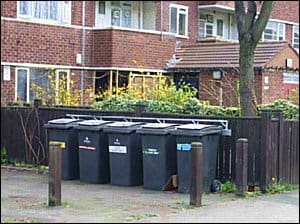Waste Watch, supported by the Safe Neighbourhoods Unit, was commissioned by Defra's Waste Implementation Programme (WIP) to produce a series of case studies of recycling and composting schemes specifically for flat dwellers.
The research looked at 16 local authorities in England – including 10 London boroughs as well as Birmingham, Bristol, Leeds, Manchester and Newcastle – as well as Paris and Berlin.
 Community group EMERGE Recycling's facilities in Hulme, Manchester, one of the case studies in the report |
The report said for a “significant” number of local authorities, recycling from flats “will be important either in meeting recycling targets or in achieving social inclusion or both”.
The approaches looked at included communal containers at central and near-entrance locations, door-to-door collections and conventional kerbside collections. Factors determining the choice of collection systems included space constraints, number of households served and material segregation systems.
Successful
But, the report said all the systems were successful “in the sense that residents separate material which is collected for recycling”. Councils operating the schemes had received good feedback from the residents involved, but what was not known was how effective the different schemes were in diverting good quality material at reasonable cost.
Commenting on the findings of the report, Waste Watch policy, research and information manager Doreen Fedrigo said: “Our research shows that some local authorities are making inroads into providing equal access to recycling facilities for all residents, not just those living in kerbside-friendly houses.
“This research is an important step in providing access to recycling schemes for everyone in the UK, giving everyone a chance to reduce their environmental impact and become more waste aware,” she added.
Planning
Other difficulties pinpointed by the research included planning the recycling schemes, made difficult because of a lack of information about flat location and ownership. The study said Geographical Information Systems (GIS) can help in this respect.
The study also warned of a “marked lack of performance related information” in the flat schemes, because while recycling tonnage data was often obtained, without adequate refuse data it is not possible to assess diversion rates. There is also no effective means to measure participation rates in systems that use communal container collection systems, it said.











Subscribe for free